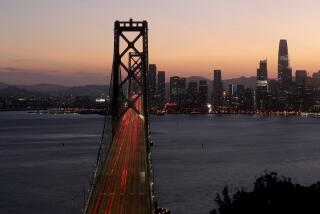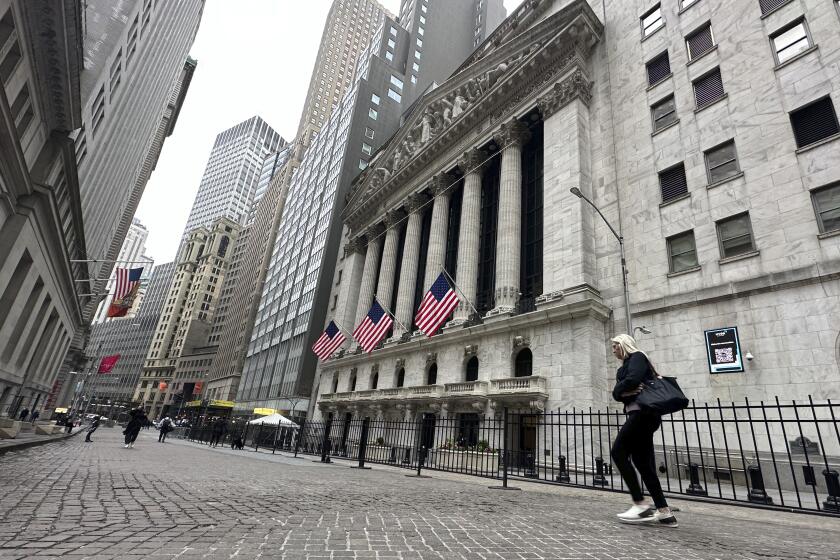Kroger to put vehicle charging stations at California, Arizona stores
To your grocery list, add electricity.
Kroger Co., the country’s largest grocery store owner, with chains including Ralphs and Food 4 Less, plans to install a total of 225 vehicle charging stations at 125 supermarkets in California and Arizona.
San Francisco-based Ecotality Inc., which operates the nation’s second-largest network of public electric charging stations for vehicles, announced Monday that it would handle the installation.
Kroger, based in Cincinnati, said it would invest about $1.5 million to install Ecotality’s Blink charging stations and DC Fast Chargers. Kroger already has 60 charging stations in Oregon and Washington and 14 in Texas.
Photos: Top 10 cars with lowest cost per mpg
So far, 37 Ralphs stores in Southern California have been selected, including locations in Pasadena, Malibu, Anaheim and San Diego, said Davin Jader, national account manager for Ecotality. The company already has installed chargers at a Ralphs in Santa Monica. More locales will be chosen in the coming months.
“It’s not a big mystery that California, and especially Southern California, is the hotbed for the EV industry,” Jader said. “It’s where the cars are and it’s where the demand is.”
Kroger is just the latest in a string of retailers to install charging stations in their parking lots. Whole Foods, Walgreen and Ikea have all added ways for drivers to juice up their electric cars at select locations.
Retailers view the chargers as a way to attract eco-conscious consumers and burnish their green credentials.
“It’s an opportunity to provide something additional to consumers who own electric vehicles,” said Don Anair, research director of Union of Concerned Scientists’ Clean Vehicles Program. “It could either get those people to visit their stores over competitors’ or to spend more time in store as their vehicles are charging.”
Kroger is installing about 200 “level 2” charging stations, which in an hour can give a car enough power to drive 12 to 25 miles, Jader said. Twenty-five DC Fast Chargers — which can fill up to 40% of a battery in about 20 minutes — will also be installed.
Ecotality previously has worked with retailers such as Sears and Kohl’s. But Jader noted that Kroger was expanding its charging network after having rolled out pilot programs in other states.
“They were able to take their data and determine there was enough value to hosting these stations to invest money into a number of locations” in California and Arizona, he said.
There are currently about 8,000 public electric charging stations in the country; about a quarter are in California, according to the U.S. Energy Information Administration. That’s a small amount compared with the 150,000 gas stations available.
Retailers are hoping to get in on the ground floor. Companies such as Kroger will not profit directly from their chargers, analysts say, but rather reap benefits from customers who shop longer while waiting for their cars to juice up.
“They can’t expect to make money on these chargers; people aren’t going to pay much for them,” said Lisa Jerram, a senior research analyst at Navigant Research.
Retailers are realizing that by building early, they can get much of the costs covered with subsidies by partnering with companies such as Ecotality, which specialize in installing and supporting charging stations, analysts said. Those companies in turn receive money — millions of dollars, in some cases — from the Department of Energy to build up an electric charging infrastructure.
Ecotality is matching Kroger’s $1.5-million contribution, and half of Ecotality’s portion is coming from Energy Department grants, Jader said. The stations will charge customers $1 or $2 per hour, depending on whether they are members of the Blink network, a nationwide collection of charging stations. Kroger and Ecotality are splitting the proceeds 50-50.
Although the charge-up price at Kroger and several other sites is significantly more than it would cost to juice up at home, retailers are betting that drivers will use the public chargers to get over “range anxiety” — the fear of running out of power and being stranded on the road.
In March, Ecotality and Campbell, Calif.-based ChargePoint Inc., which operates the nation’s largest network of independently owned electric charging stations, announced the formation of Collaboratev, a company set up to let consumers easily use different charging networks. The Blink network is to be connected to Collaboratev later this year.
Jerram estimates that 400,000 new plug-in vehicles will be sold in California by 2020. As more electric cars hit the road, retailers that decked themselves out early with charging stations hope to enjoy benefits in the long term.
“There just aren’t that many vehicles on the road. But overtime it could boost the image of stores,” Jerram said. “Right now the stores are probably thinking, ‘This is a good opportunity.’”








